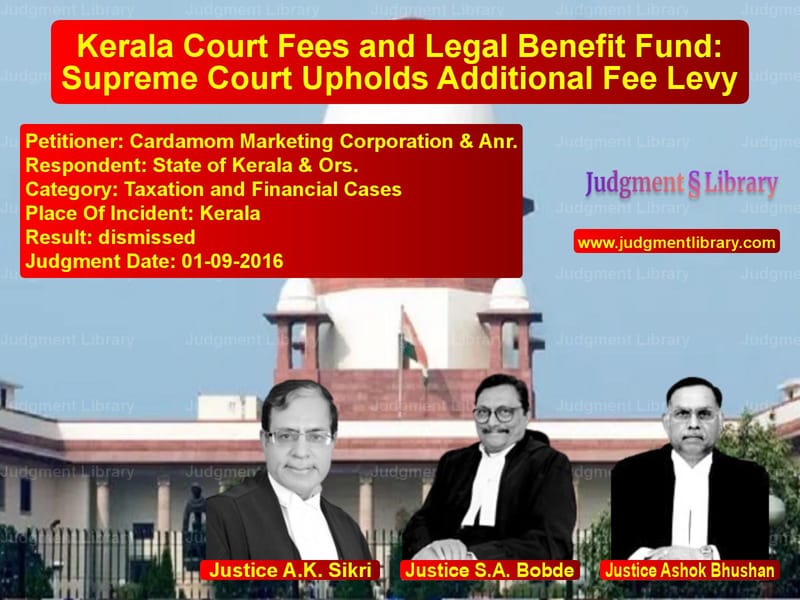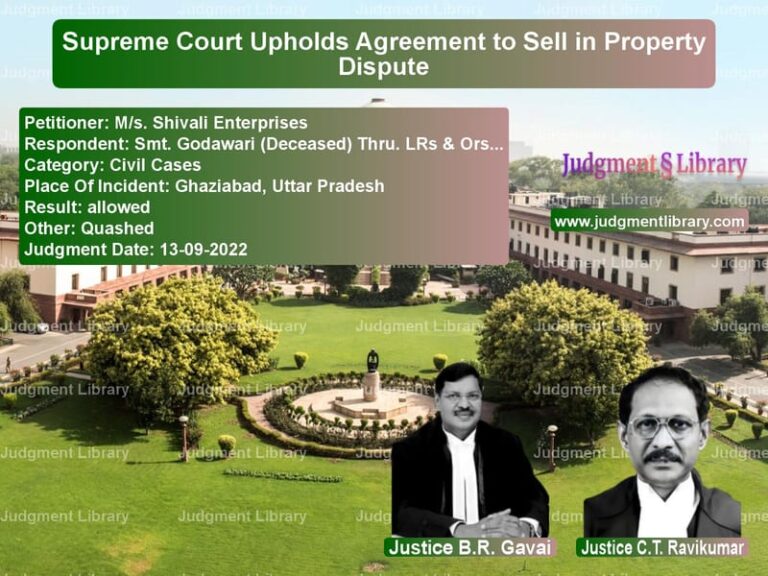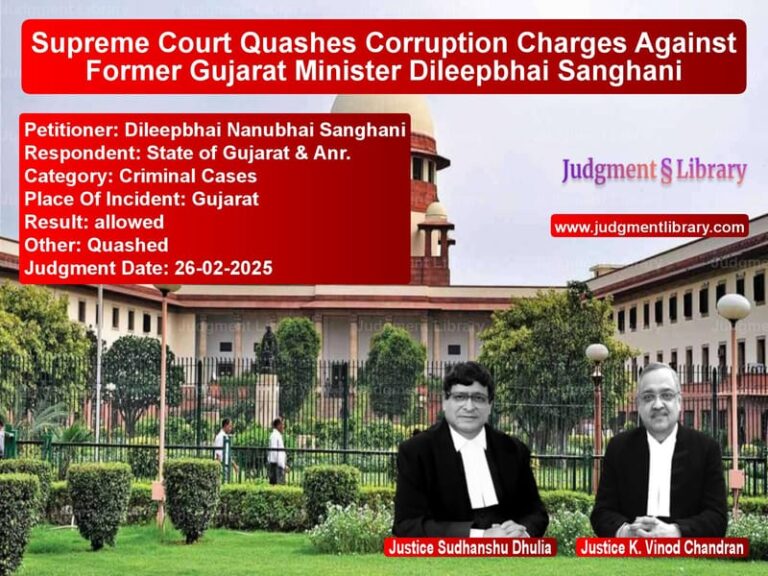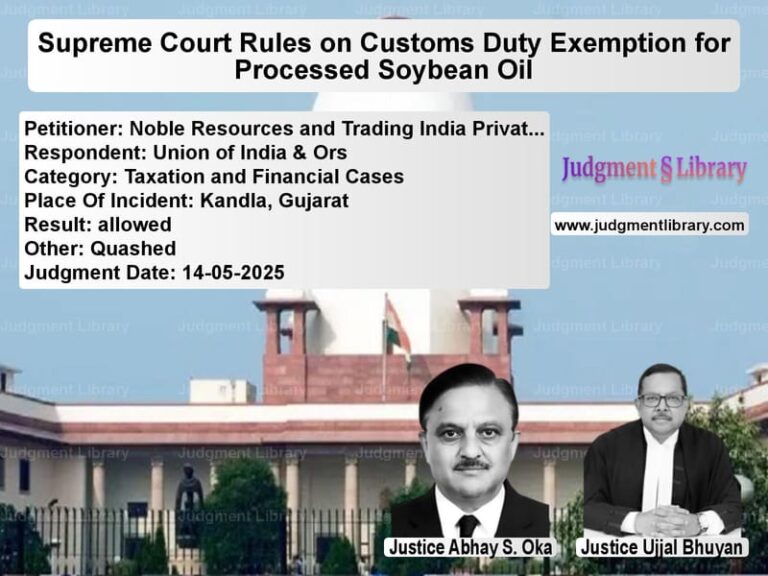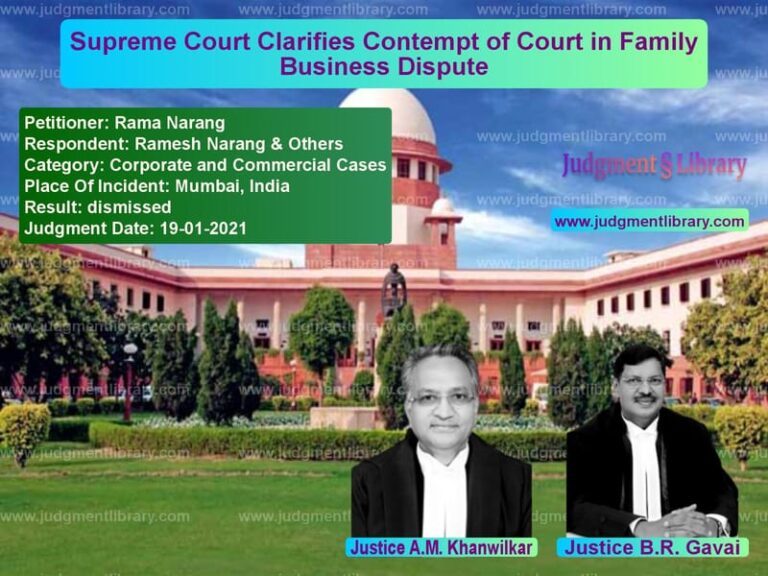Kerala Court Fees and Legal Benefit Fund: Supreme Court Upholds Additional Fee Levy
The case of Cardamom Marketing Corporation & Anr. v. State of Kerala & Ors. is a significant legal matter concerning the imposition of additional court fees by the Government of Kerala. The appellants, registered dealers under the Kerala General Sales Tax Act, 1963, and the Kerala Value Added Tax Act, 2003, challenged the constitutional validity of S.R.O. No. 226 of 2002, issued under Section 76 of the Kerala Court Fees and Suits Valuation Act, 1959 (CF Act). This notification authorized tribunals and appellate authorities to levy an additional court fee of 0.5% of the disputed amount or ₹50 in cases where valuation was not applicable, with the revenue directed towards the Kerala Legal Benefit Fund.
The appellants contended that this levy was a form of taxation without a corresponding service being provided, making it unconstitutional. The Kerala High Court had upheld the validity of this notification in Chackolas Spinning & Weaving Mills Ltd. v. State of Kerala, which formed the basis of the present appeal before the Supreme Court.
Background of the Case
The primary question before the Supreme Court was whether the additional court fee imposed by the Kerala government constituted a valid fee or an unauthorized tax. The appellants, engaged in commercial activities in Kerala, argued that the fee lacked the essential characteristic of a ‘fee’—a direct quid pro quo in return for services rendered. They claimed that the fee was being diverted towards the welfare of the legal profession rather than being used to benefit litigants, thereby making it a tax in disguise.
Arguments of the Petitioners
The appellants raised several key arguments challenging the additional court fee:
- The levy lacked a direct nexus to any service provided to litigants and was therefore a tax rather than a fee.
- The collected funds were being utilized for the benefit of the legal profession, with no direct benefit to those paying the fee.
- The imposition of an additional financial burden on litigants at multiple levels of statutory appeals and revisions was unjustified.
- The notification contravened constitutional principles and amounted to an arbitrary exaction.
Arguments of the Respondents
The State of Kerala, defending the levy, provided the following justifications:
- The additional court fee was imposed under Section 76 of the CF Act, which expressly permitted such a levy.
- The funds were being directed towards improving legal services and providing social security for the legal profession.
- The legal profession played an integral role in the administration of justice, and ensuring their welfare indirectly benefited litigants.
- The notification was within the legislative competence of the state and was not an unconstitutional tax.
Supreme Court’s Analysis
The Supreme Court, comprising A.K. Sikri, S.A. Bobde, and Ashok Bhushan, analyzed the legislative intent behind Section 76 of the CF Act. The Court acknowledged that the section explicitly authorized the state to impose an additional court fee and create a Legal Benefit Fund. The Court emphasized that:
“Providing social security to the legal profession becomes an essential part of any legal system, which has to be effective, efficient, and robust to enable it to provide necessary service to the consumers of justice.”
The Court examined whether the additional court fee was a legitimate fee or a tax. It noted that:
- The additional fee contributed to a fund aimed at improving legal services.
- The legal profession was an integral part of the judicial system, and its welfare had a direct impact on the efficiency of justice delivery.
- The levy was consistent with the objectives of the CF Act and the Kerala Advocates’ Welfare Fund Act.
Key Excerpts from the Judgment
The Court ruled in favor of the State of Kerala, stating:
“The power extends to levy additional court fees by tribunals and other appellate authorities constituted by or under any special law. The impugned notification, therefore, is intra vires the provision of Section 76 of the CF Act.”
Addressing the petitioners’ argument that the levy amounted to taxation, the Court observed:
“When we talk of a sound and stable system of administration of justice, all the stakeholders in the said legal system need to be taken care of. Legal community and advocates are an inseparable and important part of a robust legal system and they not only aid in seeking access to justice but also promote justice.”
Impact of the Judgment
This ruling has significant implications for legal practitioners and litigants. The Supreme Court’s decision establishes that states have the authority to levy additional court fees for the purpose of enhancing legal services and providing social security to the legal profession. While litigants bear an extra financial burden, the Court justified this in the broader context of improving access to justice.
The judgment also affirms the validity of similar legal benefit fund schemes in other states, setting a precedent for future cases challenging the imposition of additional fees.
Conclusion
The Supreme Court dismissed the appeal, upholding the validity of the additional court fee under the Kerala CF Act. It ruled that such levies were essential for maintaining an efficient legal system and ensuring access to justice. The decision reinforces the principle that legal fee structures can be designed to support legal professionals, thereby strengthening the administration of justice as a whole.
Don’t miss out on the full details! Download the complete judgment in PDF format below and gain valuable insights instantly!
Download Judgment: Cardamom Marketing C vs State of Kerala & Or Supreme Court of India Judgment Dated 01-09-2016-1741883838777.pdf
Direct Downlaod Judgment: Direct downlaod this Judgment
See all petitions in Tax Refund Disputes
See all petitions in Banking Regulations
See all petitions in Judgment by A.K. Sikri
See all petitions in Judgment by S. A. Bobde
See all petitions in Judgment by Ashok Bhushan
See all petitions in dismissed
See all petitions in supreme court of India judgments September 2016
See all petitions in 2016 judgments
See all posts in Taxation and Financial Cases Category
See all allowed petitions in Taxation and Financial Cases Category
See all Dismissed petitions in Taxation and Financial Cases Category
See all partially allowed petitions in Taxation and Financial Cases Category

